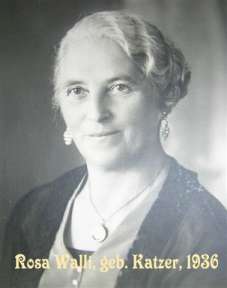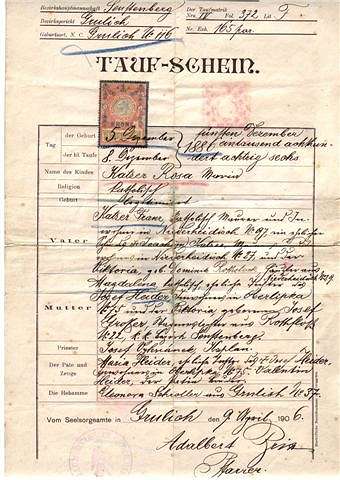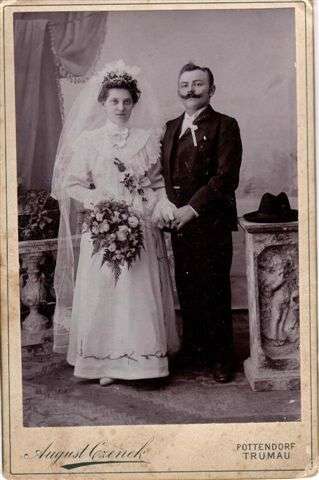| Katzer Families |
 |
Portrait: Rosa Walli, geb. Katzer
We thank Kurt Rumpler from Baden/Vienna (Austria)
for this Portrait
(translated by Bernhard Katzer - original
version see our German website)

Rosa Walli,
née. Katzer, was born on 5 December 1886 in Grulich No. 116, Bohemia,
as the first child of Franz Josef Katzer and Magdalena Victoria Heider. However
they didn't get married until 1892 – we'll probably never learn why.
The Katzers come from Nieder-Heidisch, father Franz Josef, born in 1864 and
grandfather Joachim were bricklayers there, great grandfather Josef was a peasant.
The Heiders come from Ober-Lipka, great great grandfather Franz was a farmer
in Steinbach, a female sideline , the Wahls, leads over to Prussic Herrendorf
in Silesia
After the marriage of her parents four more brothers and sisters followed Rosa:
1893 Franz, 1895 Maria, 1898 Anna Theresia and 1900 Josef.
Father ruled with a rod of iron, especially as far as Rosa was concerned. As
the oldest child she had to accept a lot of duties in the household. After
she had finished her compulsory school attendance she got a job as a spooler
in a textile factory. Although she had a right of residence in Grulich, she
left her homeland Bohemia. In Ebenfurth, lower Austria, she found a job in
a factory and the man she would marry, Josef Walli, a shoemaker.
Her sister Maria went to Switzerland as an au-pair and later got married in
England, her brother Franz was killed in Albania in WW I, brother Josef married
Ida Kürbel in 1924 and her sister Anna, a maid in Vienna, got an illegitimate
child, Anna, in 1924, who she left in Grulich with her parents, in order to
be able to continue her job in Vienna.. Until about 1940 she was employed by
the Hofrat Katzer (no relatives) family, in Grulich in summer and in a noble
mansion in Vienna-Grinzing in winter.
Rosa still liked visiting her hometown, a tiresome journey by train to Mittelwalde,
and then on to Grulich by bus. The journey wasn't cheap either, an in 1927 „ it
is truly confirmed by the administration of the community of Sollenau, that
Rosa Wally, resident of Sollenau is not in possession of any kind of fortune
whatsoever, eking out her existence as an unskilled labourer not receiving
benefits from anybody, thus being in a state of need and unable to afford the
cost of a visa to enter the Republic of Czechoslovakia“.

Five children were born, the first thee died, the last two survived: Maria,
born on 5.September 1915 und Rosa, born on 17 August 1921.
From 1908 to 1914 and from 1924 to 1932 Rosa worked as a weaver in the Pottendorf
spinning mill in the weaving mill of Felixdorf, in 1934 she had a job as a
weaver in the textile industry of Neudörfl/L. and helped her husband in
his shoemaker's shop.
After the death of her husband in 1935, she was forced to earn her living by
sewing for the neighbours, repairing shoes and a job in the factory.
In 1929 her father died, and so did her mother Magdalena in 1937. Aunt Ida
writes: „Weep with us, for our dear mother has passed away. She died
gently this morning. The last 14 days must have been very hard. She could be
left alone for a minute. My dearest Rosa, how often has she been thinking of
you hoping to get better. Now she had the dropsy after all which seem to have
crushed. It is a blessing that little Anna didn’t have to see all that.
So she will have pleasant memories of her grandmother.“
Little Anna had been in holiday camp in Denmark at that time, her mother hadn't
told her about the death of her grandmother, she learnt about it from other
people and couldn't get over it for a long time.
The political events cast their shadows. Rosa writes to her brother Josef: „Dear Brother! I approach you with a request. It is not urgent at the moment, but we will need it later at any rate. That is to say the evidence of being Arian – that we do not have any Jewish ancestors. We need the baptismal and birth certificates (which is one and the same) of the mother of our father, of the grandmother of the grandfather, the marriage certificate of our parents. Please be kind enough to get those documents for us. I will probably cost stamps. You should claim it for evidence of Arian. That may make it cheaper“.
There were no problems about that, but getting on was hard and she had to
keep her head above water with casual labour. Cold, hunger and air raids had
to be survived. In 1945 they had survived after all, but Sollenau was in the
Soviet occupied zone and every day tanks were unloaded at Felixdorf station,
and thundered past their house.
In Grulich people were even worse off, Anna had to look after an ill family
again, who she didn't want to let down and that was why she missed a transport
to West Germany. Together with her daughter Anni she was taken to an assembly
camp and sent on an endless journey to quarantine camp in a cattle wagon and
then to a harvesting in the fields. Her final destination after a number of
detours was Magdeburg. her brother Josef was expelled, too and ended up in
the West.
She kept a close contact with her brothers and sisters, exchanging letters
regularly. She liked writing letters, with a very neat handwriting. Often she
wrote short essays such as „A Christmas Evening in Grulich“ or
stories in the Grulich dialect, which she sent to her sister Anna. Unfortunately
none of them is left. In detail she noted down letters, revenue, expenditure
and daily events in an exercise book. Every letter from her sister Maria in
London contained a pound note, or even two on special holidays.
In a small garden she had made patches of vegetables and herbs. With a small
handcart she went to the not too close pine forest to collect fuel. Hardworking,
modest and the epitome of goodness she even received a small pension in the
sixties:" My husband died 25 years ago and I didn't get married again,
nor did I have a partner. As, according to the new law, even those wives, whose
husband died before 1939 , can claim a small pension...“ she wrote in
her petition.

Her sister Maria was best off and so a reunion could be planned. She came
from London by plane and met her sister for the first time after 60 years.
At a further meeting in 1970 even brother Josef came to Sollenau form Herbstadt.
His wife Ida had died two years before, two months after the meeting brother
Josef died, too, following an operation after a tetanus.
At the end of the sixties daughter Rosa left their shared flat together with
her family and Rosa Walli, at an age of over 70 years, now lived alone for
the first time in her life. She could well look after herself, knitting and
sewing for neighbours and great grandchildren, cooking for her grandchildren,
shovelling snow and coals, cutting wood, working in the garden, writing letters
and aphorisms: „Lustig Blut und froher Sinn – Fort ist fort, hin
ist hin!“; „Willst Du Ruhe, willst du Frieden – Musst Du
alle Menschen lieben!“; „Frohes Leben, Hehres Streben, Gesundheit,
Glück, Zufriedenheit, Das wünsch ich Dir zu jeder Zeit!“.
Her diary shows an extremely positive attitude to life:
"
5 December 1966: celebrated my birthday. Received a huge basket of food, 2
litres of wine and a warm nightgown. It's a pity that you don't get 80 more
often.
4 January 67: received pension, 80 shillings rise, that is to say 1.080,90
S.
14 March 67: Received 35 shillings and 5 eggs for needlework from Mrs. Sch..
Embroidery of Mrs F. – paid for with meat.
27 March 67: Doing lots of embroidery and sewing during the week. Got my holiday
meat for free from Mrs F. Starting then third pair of woollen socks, white
ones. It’s a nice work. Received wonderful Easter presents from my children.
20 October 67: The first white frost, windows frozen, all Dahlias and tomato
leaves killed by frost. One plant was carrying about 30m tomatoes. Not all
of them got ripe though, despite being covered at night. It was a nice day
today. Cleaned up the garden, dug out the Dahlia roots.
7 November 67: sold 30 kg of tin and iron, received 3 shillings. Collected
it once - never again!
20 November 67: A beautiful day after the fog last week. sawed and cut a lot
of wood. Severe cold at night. Water got frozen in the vases at the window.
6 December .67: Have a lot of needlework, which I always enjoy.
11 December 67: Today you can say: Oh yes, winter is here. Heavy snow since
early morning. It's nice and warm in here and I am busy doing needlework.
31.December 67: New Year's Eve – New Year! Holidays are over, everybody
is satisfied, me. too.
That was how she lived, until November 1975, for several months she had had
trouble with her stomach and her pancreas. On November 18, Rosa Walli died,
at an age of 89 years.
As the last of her brothers and sisters, Maria Katzer died in London in 1994,
almost 99 years old.